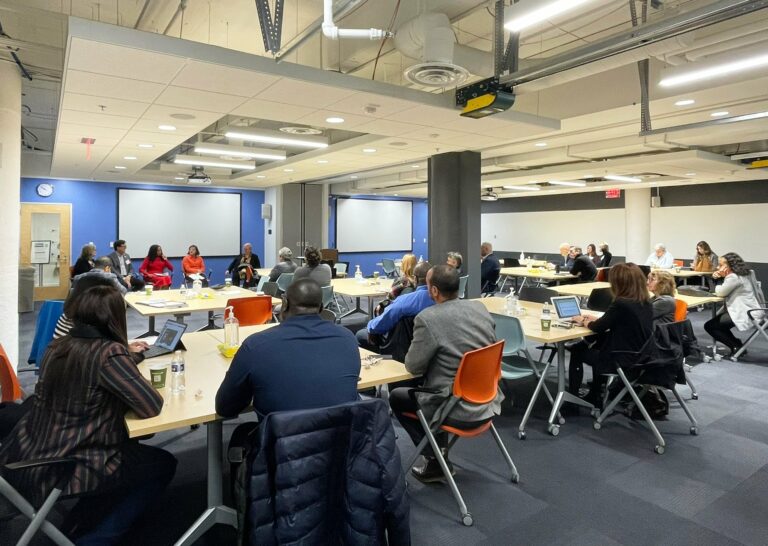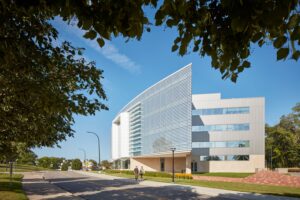
- Kim Kisner
- Events
- 11/07/2023
Businesses in the Great Lakes Region Share Sustainability Efforts at SBND Event

A sustainable Great Lakes region cannot be achieved without the leadership, involvement, and commitment of businesses.
From decarbonization and the circular economy to water stewardship and workforce development, businesses across all industries and sizes have a unique opportunity to make decisions and investments that impact the region
On October 31, the Sustainable Business Network of Detroit (SBND) and the Council of the Great Lakes Region (CGLR) held a jointly organized event to hear from business leaders who share a commitment to sustainable development and learn about the actions they are taking to embed sustainability in their operations and corporate strategies.
Discussion focused on the role of businesses in sustainability, measuring the data, automation, and workforce development.
The panelists were:
Edna Lorenz, energy director for Corewell Health.
Mark Schrupp, executive director, the Detroit/Wayne County Port Authority.
Lillian Woolley, senior chemical engineer, Fishbeck.
Shanelle Jackson, senior manager for State Government Relations for LyondellBasell.
Colin Bird, Consul General of Canada in Detroit, also participated as a special guest.
Takeaways follow:
Bird: This region really is the epicenter of North America, and we have the ability to become the green economy that powers the world and addresses climate change issues around the globe.
Wolley: Regarding the role businesses have in sustainability, I think every business and industry is different. Businesses certainly need to support the efforts the state has committed to, and there are programs and utility rate breaks available to help.
Shrupp: Businesses will do what is in their interest financially. Five years ago, businesses were largely not engaged in sustainability, but they are at the table now because government entities – and their customers – have made it a priority.
Jackson: I think employees today want to be proud of the company they work for and are demanding more and more from companies regarding their sustainability commitments.
Shrupp: The Port of Detroit is the linchpin of manufacturing in the city. Heavy industry comes in here and that’s been a huge cost to the environment and air quality. We are developing a decarbonization plan now and we hope to create the greenest port in the Great Lakes and act as an example for others.
Jackson: When it comes to sustainability, we are engaging employees at every level from the factories to the C-suite, and having the conversations.
Woolley: When it comes to metrics there are companies that are good at it and companies that don’t know what they should be looking at. There are lots of tools available to help though.
Lorenz: One of our 2024 initiatives is water. Not just the water we drink but the water we wash our hands and bedding and dishes in. Hospitals utilize water for heating and cooling and there is chemical treatment of that water. This is a big initiative for us in 2024.
Shrupp: Working in a port region is a dirty job. The air quality is bad. We are working to raise the level of standard and pushing that agenda throughout the industry.
Jackson: I’ve been hearing women and people of color are saying we’ve seen a decline when it comes to DE&I. There was a push for it in 2020 (and before) but was it a thing of the moment?
Lorenz: I think healthcare is embracing automation. We have robots delivering food to patients and robots making food. The industry is utilizing software and AI solutions to supplement human staff so that human staff is better able to focus their attention on the data analysis piece.
Jackson: Our top goal is to help end plastic waste so we need the latest technology to do that. LyondellBasell is consistently investing in opportunities to increase innovation in ways that will ultimately save us money.
Shrupp: There is a lot of work to be done. We need more young people to choose to live in this region and help our businesses transition. Millennials are raising the importance and demand for sustainability.
Be sure to subscribe to our newsletter for regular updates on sustainable business practices in and around Detroit.
Kim Kisner
- All
- Business
- Community
- Education
- Events

ZF Group, a global technology company with its North American headquarters in Northville, specializes in systems for passenger cars, commercial vehicles, and industrial technology. With a focus on next-generation mobility, the company develops solutions that address electrification, automation, and digitalization while aiming to improve safety, efficiency, and sustainability in transportation. SBN Detroit interviewed Anuj Shah, Sustainability Lead, for the Americas, to explore the most pressing environmental challenges in...

The Chip Bag Project, based in Detroit, is a sustainability initiative that upcycles hard-to-recycle snack packaging — particularly chip bags — into insulated sleeping bags for individuals experiencing homelessness. Founded by Eradajere Oleita, the project addresses both environmental waste and housing insecurity by transforming materials like Mylar into practical, thermally efficient solutions. In June, Oleita was among Trelllis’s 30 Under 30, its annual recognition of the brightest young...

PowerPanel, headquartered in Oxford, focuses on sustainable energy technology with a particular emphasis on hot water systems and thermal energy capture. The company designs and manufactures modular solar hybrid systems that integrate both photovoltaic and thermal components into a single unit. Its goal is to offer energy solutions that are more efficient, durable, and economically viable for a range of commercial and industrial applications. SBN Detroit interviewed Garth...







